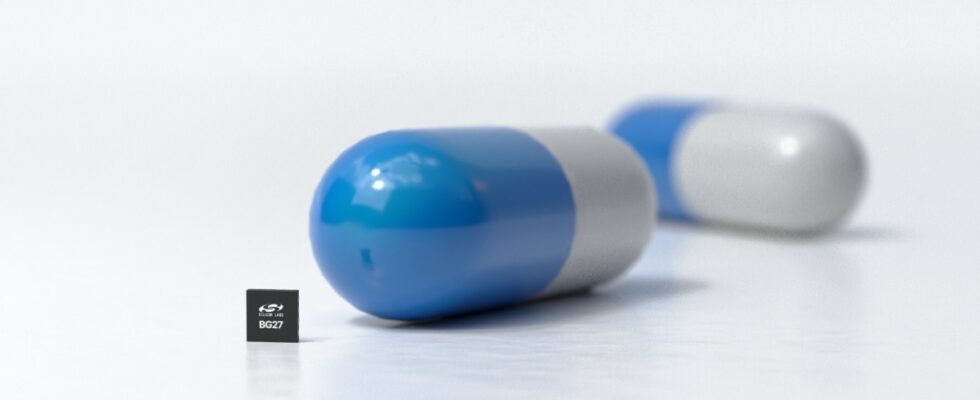Silicon Labs, an American semiconductor specialist, has developed chips that could revolutionize the field of connected health. Due to their size and performance, they can power tiny implants, starting with a small sensor placed on the tooth to analyze saliva.
Manufacturers of portable devices seek to miniaturize technologies: the smaller an implant, the less it disturbs its wearer. However, smaller products generally have less battery life.
Small enough, power-efficient chips for wearable health devices
Silicon Labs’ new chipset, consisting of the BG27 and MG27 chips, could be a game-changer. Measuring 2 to 5 millimeters, they are among the smallest chips in the world and above all, they are very energy efficient, according to the company. These characteristics make them ideal candidates for powering portable connected health devices.
The BG27 model is currently being tested by Lura Health, a company specializing in the development of saliva diagnostic sensors. ” Saliva is an incredible diagnostic fluid, used to test for over 1,000 health conditions. Health professionals even consider saliva to be the new blood of health diagnostics. However, there is no way to analyze saliva continuously, as it depends on a one-time sample and laboratory analysis. “, she explains on her website.
A dental sensor to analyze saliva and detect diseases
With this in mind, she is working on a device positioned on the tooth, which would permanently monitor a patient’s saliva, and says she has completed clinical trials of the sensor with UConn Orthodontics, dental health division of the University of Connecticut. . The Federal & Drug Administration (FDA), the US federal agency responsible for approving the marketing of food and drugs, will now apply its validation process to the device. If all goes well, it could be on the market within 12 to 18 months.
“ The BG27 is amazing because it’s small enough that we can develop an IoT sensor smaller than a tooth, the power consumption is low enough that battery life is no longer a product constraint, it has enough memory to store a sophisticated firmware application, it allows us to perform the data analysis necessary to obtain relevant information from what we are monitoring, and it has all the peripherals we need for us interface with our sensors said Noah Hill, co-founder and CTO of Lura Health.
Silicon Labs’ technology has the potential to be used in other systems, such as medical patches, continuous glucose monitors for people with diabetes, or even portable electrocardiograms. If these technologies already exist, the company’s chips will make it possible to miniaturize them and therefore make them less invasive for patients.
Sources: Silicon Labs, Lura Health, The Verge

5